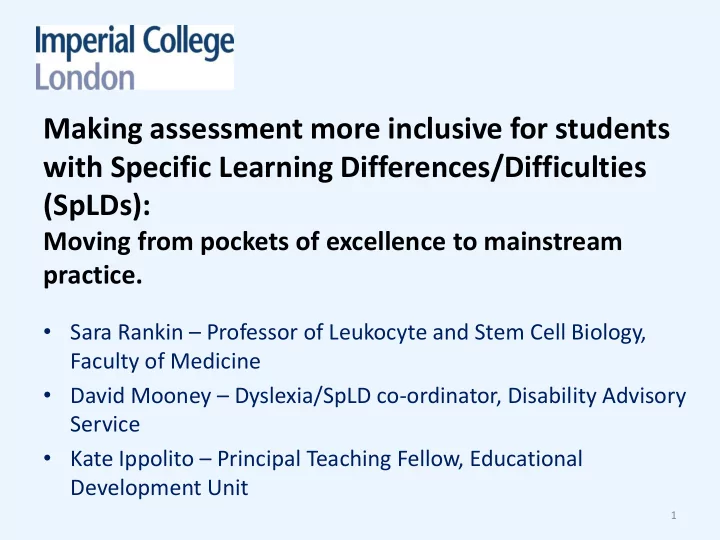

Making assessment more inclusive for students with Specific Learning Differences/Difficulties (SpLDs): Moving from pockets of excellence to mainstream practice. • Sara Rankin – Professor of Leukocyte and Stem Cell Biology, Faculty of Medicine • David Mooney – Dyslexia/SpLD co-ordinator, Disability Advisory Service • Kate Ippolito – Principal Teaching Fellow, Educational Development Unit 1
Workshop Learning Outcomes By the end of this workshop you will be better able to: 1. Identify barriers to assessment currently faced by students with SpLDs 2. Increase your repertoire of strategies to support learners with SpLDs 3. Embed good practice , inclusive examples in their own educational contexts 4. Motivate and support academic colleagues to develop more inclusive assessment practices 2
Excellence Fund for Learning and Teaching Innovation Project - context • Equality Act 2010 – Disabilities are protected characteristics • Making curricula more inclusive - one of four key pillars of Imperial College's Learning and Teaching Strategy • Reducing and diversifying our assessment methods - key objective in university-wide UG curriculum review project (Phase 1 completed April 2019) 3
Excellence Fund for Learning and Teaching Innovation Project – departure points • More medical students identify with SpLDs - year 4 - intercalated BSc • Students with SpLDs (diagnosed/undiagnosed) do not always engage with Disability Advisory Service. • Half of SpLD students (5% of total student population - estimate) receive only exam arrangements or nothing at all ie: no support • Students need a blend: – well-designed, inclusive programmes, including assessment – programme-embedded Inclusive Technologies – embedded study skills and 1:1 study skills 4
Differences – Difficulties - Disabilities Inclusive Learning Environment Difference Mild impact Learning Dyslexia ADHD Dyspraxia Autism Difficulty Non inclusive Learning Environment Disability Severe impact
Activity • In small groups please identify and discuss common barriers to assessment for students with SpLDs. (5 mins) 6
Student perspectives: Challenges • Too much and unspecified pre- reading for assignments, “dense texts, hard to unpick” • Jumping between topics and lack of flow to lectures impacts on visual revision strategies • Inclusive technologies – – requires time and shift in mind set to use them efficiently – perceived lack of remote, flexible access? – outdated beliefs about quality of technologies 7
Student perspectives: Challenges • Late or lack of clarity on assessment expectations e.g. style of essay, nature of exam questions discursive not factual • “Important assessments continually, I felt that pressure continually ” • Group work that is summatively assessed • Lack of transparency or dialogue about how other students approached in-course assessment, how long they spent etc. 8
Student perspectives: Preferences • Signposting potential challenges of yr 4 for students with SpLDs (role model) • Chance to talk one-to-one with tutors or DAS about their needs and study strategies • All assignment tasks at the beginning of the year so they can start early • Alternatives to written assessment e.g. posters, pod casts and scaffolded, paired oral presentations • Panopto lecture capture 9
Student perspectives: Preferences • Creative, visual assessment to enhance repertoire “So I’ve always colour-coordinated notes and everything. And when I revise, I normally do mind maps. But this year, really, I’ve had a lot of skills in my course. For example, learning about different practices. And we had a collage workshop, which is great. And I think that’s really opened my eyes to how it could be used in this context, and it really suits my goals.” • Exams over in-course assessment • An indication of an SpLD to examiner • Dialogic feedback “ we could go and sit down with someone who had marked our essay and sort of talk everything through…and ask anything additional we wanted .” 10
Activity In your small group please: • Discuss the assessment examples – Inclusive viva exam – Assessment to promote and reward creativity – Using QuickMark in Turnitin for inclusive feedback • Critically evaluate its suitability for various contexts • Share alternatives and refinements 11
Activity Moving from pockets of excellence to mainstream practise • In your small groups, please identify the challenges and successes you’ve had when engaging colleagues and attempting to mainstream inclusive assessment. 12
Challenges and strategies Challenge : To secure different stakeholder buy-in and collaboration – learning technologists, teaching fellows, senior academics and managers Educational Development Unit (EDU) ‘Introduction to making teaching more inclusive’ – 1 day workshop Perspectives in Education – Geoff Layer – Vice Principal University of Wolverhampton. ‘Adopting a more inclusive and extensive approach to supporting students’ UG Medicine – meetings with programme directors and pathway leads to encourage inclusive practice for students with SpLDs at curriculum redesign stage Cross-university staff development workshops – building capacity to develop inclusive practice at pedagogical transformation stage Development and signposting of EDU inclusive teaching toolkit – https://www.imperial.ac.uk/staff/educational-development/teaching- toolkit/inclusive-learning-and-teaching/ Learning Technologists meetings – Blackboard ALLY – good practice audits 13
Challenges and strategies Challenge : To embed Inclusive Technologies in the College’s structures and to increase usage Inclusive Technologies Service enhancement plan – 16 networked commercial and open source tools Accessibility awareness day - collaboration with Microsoft 365 Service Level Agreement for training – Diversity and Ability Ltd Inclusive technologies - key staff workshops Inclusive Technologies student workshops all students (including students with SpLDs) – plan to embed in departments Inclusive technologies 1:1 training (students with SpLDs) 1-2 half days Social Media and College Communications - promotion 14
15
Challenges and strategies Challenge : To increase assessment choices and inclusion Modelling of assessment variation across curriculum Discussions around offering assessment choice (equity/ parity) Moving from exam arrangements to inclusive practise (extra time/ computers/ readers/ separate rooms) Exam replacements Tablet MCQs – accessibility issues Group work options Modelling of inclusive assessment practices on MEd in University Learning and Teaching and internal educational conferences and seminars 16
Recommend
More recommend